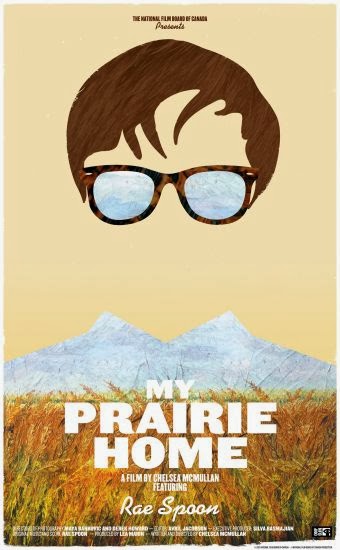My Prairie Home by Chelsea McMullan
The only Canadian feature film in the official selection of this year's Sundance Film Festival, My Prairie Home was enthusiastically received in Park City, Utah. In the 77-minute NFB documentary, filmmaker Chelsea McMullan follows Montreal-based indie singer Rae Spoon across Alberta, Saskatchewan and Manitoba in a Greyhound bus. But this is not your standard music documentary of a road trip. As we travel the highway across the endless prairie, we learn about the hills and valleys of Rae Spoon's early life.
The indie singer was raised in an evangelical Christian family under a tyrannical father, a church deacon of questionable mental health. Early on Spoon sought refuge in music to avoid her parents' continual sightings of signs of the Rapture. Life was already difficult enough for Spoon who couldn't see herself as a wife and mother, answering to a husband. In fact, a husband was almost unfathomable. Spoon is gay and describes herself as gender neutral, using the personal pronoun "they" in self-reference. As can be expected, high school was not easy, nor was coming out. In a soft-spoken manner, Spoon relates standing up to family, community and high school bullies, but the prairies remain an integral part of Spoon's identity and the place the singer still calls home.
Besides the stunning shots of the Canadian prairie, the viewer is treated to Spoon's hauntingly beautiful singing voice. For anyone who has driven across Canada, the prairie provinces seem endless. But there is a magical beauty to the golden velour-textured wheat fields and that great big prairie sky. My Prairie Home is a moving coming-of-age film that may be instrumental in challenging many preconceived notions about the transgendered.
If you missed the film at the Rencontres Internationales du Documentaire de Montréal the NFB is screening it free online for 48 hours (January 26 and 27). To view the film on the NFB site click here.
Other film reviews
The Missing Picture by Rithy Panh
Detropia by Heidi Ewing and Rachel Grady
Finding Dawn by Christine Welch
The Fruit Hunters by Yung Chang
.
Read more »
The indie singer was raised in an evangelical Christian family under a tyrannical father, a church deacon of questionable mental health. Early on Spoon sought refuge in music to avoid her parents' continual sightings of signs of the Rapture. Life was already difficult enough for Spoon who couldn't see herself as a wife and mother, answering to a husband. In fact, a husband was almost unfathomable. Spoon is gay and describes herself as gender neutral, using the personal pronoun "they" in self-reference. As can be expected, high school was not easy, nor was coming out. In a soft-spoken manner, Spoon relates standing up to family, community and high school bullies, but the prairies remain an integral part of Spoon's identity and the place the singer still calls home.
Besides the stunning shots of the Canadian prairie, the viewer is treated to Spoon's hauntingly beautiful singing voice. For anyone who has driven across Canada, the prairie provinces seem endless. But there is a magical beauty to the golden velour-textured wheat fields and that great big prairie sky. My Prairie Home is a moving coming-of-age film that may be instrumental in challenging many preconceived notions about the transgendered.
If you missed the film at the Rencontres Internationales du Documentaire de Montréal the NFB is screening it free online for 48 hours (January 26 and 27). To view the film on the NFB site click here.
Other film reviews
The Missing Picture by Rithy Panh
Detropia by Heidi Ewing and Rachel Grady
Finding Dawn by Christine Welch
The Fruit Hunters by Yung Chang
.



















